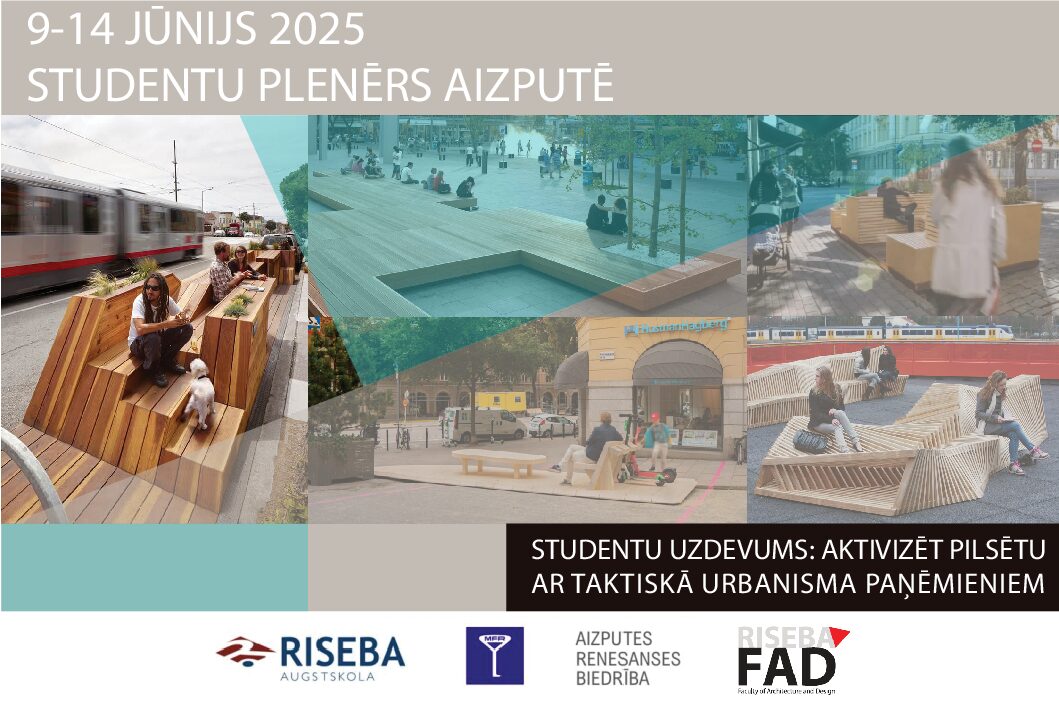RISEBA architecture students unlock Aizpute’s potential through a tactical urbanism project

Project “Tactical Urbanism in Aizpute – Playing with Ideas” is a public space development initiative launched by the Aizpute Renaissance Society. It aims to implement the vision set out in the “Aizpute 2040” concept — to create an inclusive, sustainable, and people-centred public environment through the involvement of the local community in its formation.
At the heart of the project is an architecture student workshop (plein air), initiated by RISEBA University, during which students, in collaboration with Aizpute’s residents and experts, will explore the city’s so-called “blind spots” — unnoticed, unused, or potentially problematic places in everyday life that exhibit spatial or social gaps.
During the plein air, these places will be studied and analysed, and their potential will be tested using tactical urbanism methods: temporary, functional, and movable urban furniture will be created and installed. These will serve as design prototypes — simple, low-cost solutions to test how certain areas might be used and how local people respond to them.
Tactical urbanism is an approach in urban planning and design based on small-scale, quickly implementable, low-cost, and community-driven interventions in public space. It fosters greater engagement, experimentation, and sustainable development.
This approach is especially significant for small towns like Aizpute, where decision-making around public space is often slow and public participation is limited. The project offers an inclusive, cost-effective, and test-oriented alternative — one in which the community, students, and municipality act as partners. The created solutions, their evaluation, and feedback from the public will not only lead to meaningful improvements in the urban space but will also strengthen the role of residents in shaping the city’s future.
The long-term goal of the project is to foster inclusive and community-based urban development in Aizpute, creating an environment that reflects the needs and desires of its residents. The student’s plein air will help identify public spaces in Aizpute that require spatial activation. Proposed improvements in these areas will be tested in real-life settings through tactical urbanism practices such as temporary design prototypes, urban acupuncture, and the principle of “planning by doing.”
This approach will allow both the community and local authorities to jointly assess the impact of proposed changes before making long-term and potentially costly decisions about urban development.
In the short term, the main goal is to organise the student plein air in Aizpute, during which temporary urban furniture will be designed and installed. These pieces will serve as design prototypes for testing community needs and informing municipal decisions. The furniture is intended to remain in public spaces during the warm season, until October.
The project is guided by the values defined in the “Aizpute 2040” strategy developed by the Aizpute Renaissance Society — sustainability, community involvement, urban quality, and accessibility — while encouraging a creative and innovative approach to small-town urban development.
Planned Programme of the plein air:
June 9
Walk through Aizpute’s historic centre, city analysis and conversations with residents
Expert lectures, discussions and creative sketching workshop led by experts
June 10
Expert lectures
Creative sketching workshop
Sketch presentation and discussion, selection of sketches to be built
June 11
Expert lecture
Sketch adaptation for real-world implementation
First construction work begins
June 12
Practical construction of urban furniture
June 13
Continued furniture construction
June 14
Transport and placement of furniture in public spaces
Official opening ceremony, handover of the installations to city residents and municipal representatives
Project Partners and Contributors
- Municipality of South Kurzeme (Dienvidkurzeme)
- Aizpute Renaissance Society
- RISEBA University students and faculty
- Latvia University of Life Sciences and Technologies (LLU) students
- The local community
- Latvian State Culture Capital Foundation